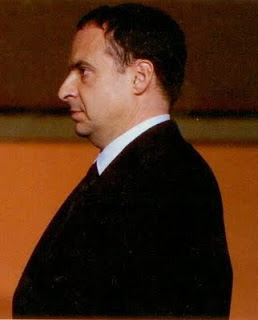
I provided two written reports for Albert and Jean-Luc ALLAVENA (JLA), and a copy for each to read.
The first dealt with Franck BIANCHERI, a four-page, single-spaced document that they read, simultaneously, in front of me.
They had, of course, already heard much it of it orally, during the course of several briefings. But nothing compared to seeing our findings fully presented in typescript.
When the Prince finished reading, he looked at me, then JLA, and said quietly, “We should make BIANCHERI ambassador to Uganda.”
Next: our written report on how to revamp SIGER.
The Prince and JLA nodded at one another after they finished reading.
The Prince’s next stop, along with JLA: a six o’clock meeting with Jean-Paul PROUST, specifically to address the minister of state’s desire to create his own intelligence service.
Before departing M-Base, the Prince urged me to quickly proceed with a written report on Philippe NARMINO. “The French,” he said, were pressing him to appoint NARMINO chief of judicial services.
(The pressure to appoint NARMINO chief of judicial services was not coming from “the French,” as the Prince put it, but from GLNF, the Freemason lodge--according to the code-named POLO, a senior Mason reporting to me. NARMINO was allegedly a GLNF Freemason. In 1999, a French magistrate named DAVUST was seconded to Monaco to direct the judicial service. DAVUST had been transferred to Paris in 2003 to take charge of judicial personnel. Ever since, DAVUST, a GLNF brother Mason, had been pushing hard for NARMINO to be placed in his old Monaco job.)
The Prince also tasked me with background checks on two new names:
David IACOBACHVILI: The Russians had proposed this individual to be their Consul to Monaco.
Igor YOURGENS: Supposedly, Monaco’s Consul to Moscow, though neither the Prince nor JLA were certain of this.
At 9:10 precisely the Prince phoned me, having just concluded his meeting with Minister of State PROUST.
He and JLA had shot down PROUST’s plan to create an intelligence service under Alain MALRIC.
“PROUST needed resuscitation,” the Prince told me excitedly, enjoying the thrill of finally taking charge. “He looked as if he was having a coronary.”
When the Prince returned to M-Base twenty minutes later, I stood outside the elevator awaiting him with a celebratory martini in hand.
Congratulations, you are finally standing up for yourself and your principality.
Inside, sitting at the bar, the Prince replayed it for me: PROUST claimed to have consulted French Interior Minister Nicolas SARKOZY and Prime Minister Dominique de VILLEPIN with his plan, and said he had received their blessing.
When ordered by the Prince to expand SIGER instead, a crestfallen PROUST replied, Of course we can do that, but we need an international department. PROUST’s idea: Bring in three French intelligence officers to handle liaison.
I shook my head and reiterated the hazards of permitting another country to co-opt the Prince’s intelligence service.
The Prince phoned me at midnight the following evening.
“Let me guess,” I quipped. “You want a martini?”
In fact, the Prince wanted to drop by M-Base next afternoon for further discussion.
But before him, JLA appeared at M-Base, at 7:30 in the morning—his normal time for starting work.
The day before, a Monegasque banker had sent JLA a case of champagne. So the chef de cabinet devised a gift policy: He shared the champagne among Palace staff and let it be known, as an example to others, that all Palace staff will share any gifts directed to me.
I provided JLA with a cryptographic cell phone for future communication. (I gave the Prince one, too, but Albert neglected to learn how to operate it—and, in any case, neglected to carry it with him. He could hardly be blamed for this; he already carried two cell phones and received, he once calculated, fifty calls per hour, mostly from women who believed it their destiny to become Albert's princess.)
I possessed information from a reliable source that Thierry LACOSTE had re-vamped his concept of creating a “kitchen cabinet,” whose true aim would be to wield influence from behind-the-scenes by those (LACOSTE, Steven Saltzman) who maintained conflicts of interest.

Lacoste: "Bathroom cabinet"
“We don’t need a kitchen cabinet,” said a bemused JLA. “We’ve got a real one. I’ll tell the Prince that I’ll leave if a kitchen cabinet is created.”
“May they at least form a bathroom cabinet?” I joked.
LACOSTE had just told JLA’s new cabinet communications director about his meetings in Los Angeles with Tamara ROTOLO’s lawyers, and then instructed her not to tell JLA, which was not only petty, but also insensitive and downright stupid.
It validated other stories doing the rounds about LACOSTE’s indiscretion and incompetence.
Also this: LACOSTE was trying to launch a “think-tank conference” in Monaco and had sent the Palace a six-figure invoice to foot the cost.
JLA intended to speak to LACOSTE later in the day--to annul the invoice and quash his plan for a “think-tank.”
And so, by now, LACOSTE, among others, were sorry JLA had wound up as the Prince’s chef de cabinet.
The un-sheathed knives were being sharpened.
HEBDO: Is it true that you asked him to make reports?
ALBERT: No. It was he who said he heard many rumors in Monaco and has taken the initiative to write notes on different people.